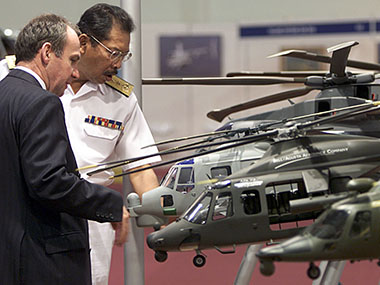 Milan, Oct 18: Guido Ralph Haschke, the alleged middleman in the Rs 3,600 crore AgustaWestland VVIP choppers deal, has been arrested by Swiss authorities on charges of bribery, Italian media reported.
Milan, Oct 18: Guido Ralph Haschke, the alleged middleman in the Rs 3,600 crore AgustaWestland VVIP choppers deal, has been arrested by Swiss authorities on charges of bribery, Italian media reported.
According to Italian news website, La Repubblica, Haschke could be brought to Italy by next week in case he prefers not to appeal against extradition proceedings before the Swiss Federal court.
The court in Switzerland ruled that Haschke can be extradited to Italy, Italian news agency ANSA reported yesterday.
The Rs 3,600-crore VVIP AgustaWestland helicopter supply contract is under probe of Italian and Indian agencies for alleged kickbacks paid to Indian officials - including former IAF Chief SP Tyagi - to clinch the deal.
Tyagi has denied allegations of any kickbacks.
Swiss-American Haschke is one of the 13 accused in the FIR filed by CBI which is probing the bribery allegations in the deal.
"Guido Haschke and Carlo Gerosa (both middlemen) managed to send 5.6 million euros through Mohali-based IDS Infotech and Chandigarh-based Aeromatrix Info Solutions Private Ltd to India and kept the remaining amount of about 24.30 million euros received from AgustaWestland with themselves in the account of IDS Tunisia," according to the CBI FIR in the case.
The Italian prosecutor who carried out the preliminary inquiry here has alleged that the CEO of Finmeccanica, the parent company of the UK-based AgustaWestland, had used services of middlemen to bribe Indian officials.
CBI which carried out the probe in India had named 13 individuals, including Tyagi and European middlemen Carlo Gerosa, Christian Michel and Guido Haschke, in the FIR as accused, in connection with the alleged bribery.
The Indian investigative agency has alleged that during his tenure as the IAF chief, Tyagi and "with his approval" the Air Force "conceded to reduce the service ceiling for VVIP helicopters from 6,000 m to 4,500 m as mandatory (although) it was vehemently opposing the same on grounds of security constraints and other related reasons".





Comments
Add new comment